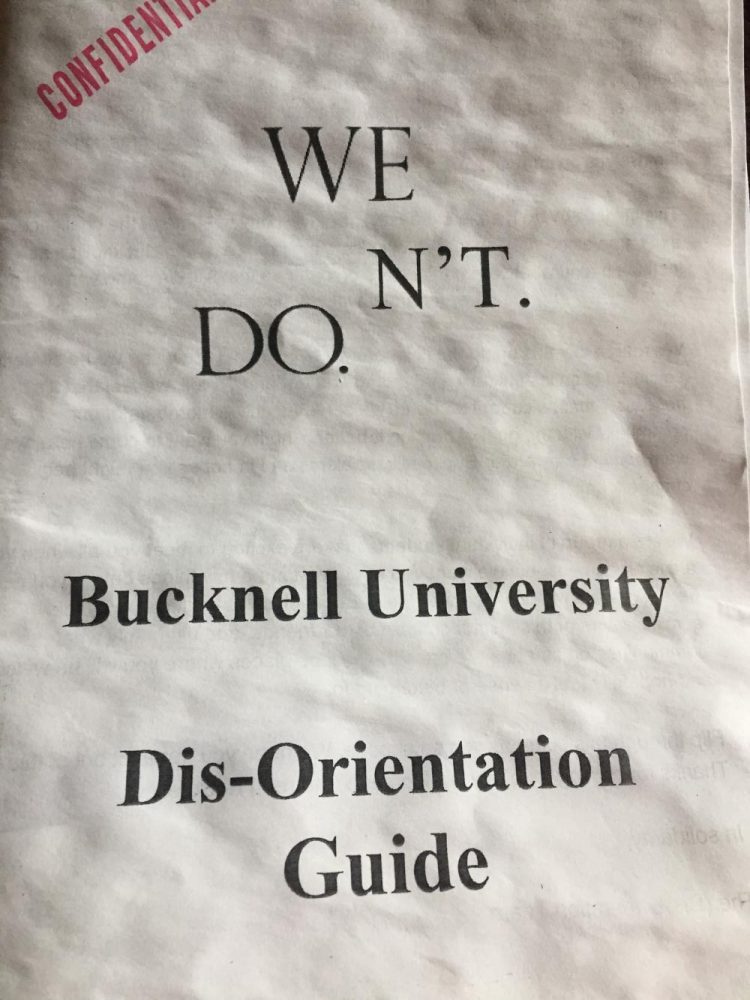“WE DO.N’T” pamphlets circulate campus during Admitted Student Open House
April 27, 2017
While prospective students and their families were visiting campus during the University’s Admitted Student Open House (ASOH) on April 22, several typed pamphlets titled “WE DO.N’T,” were simultaneously circulating around campus. The 15-page booklet’s title, “Bucknell University Dis-Orientation Guide,” referred to the University’s WE DO campaign, which encourages University students to work together in life and learning to turn the University’s plans for the future into reality.
The pamphlet included an opening page which explained its purpose, followed by multiple pages including an annotated campus map, a history of student activism at the University, figures summarizing the University’s statistics regarding sexual assault and Greek life, and excerpts from articles published in The Bucknellian.
One page included an excerpt from a poem written and performed at the Solidarity March in October 2016 by Jackson Pierce-Felker ’18.
“I sent the organizer a few excerpts from the larger piece and gave them free reign to do whatever,” Pierce-Felker said.
“I was polite this summer when a 1968 alumna told me I needed to uplift my race, the year before that another told me identifying as black was a mistake, discrimination is ingrained in the bones of this place,” Pierce-Felker’s poem said. It continued, “Finding real change on this campus is like finding a mermaid.”
Though the creators of the pamphlets are unknown, “the Invisible Committee was responsible for the flyers,” according to Pierce-Felker, who was not an organizer of the pamphlet.
The Invisible Committee, according to Wikipedia, is “an anonymous author or authors who have written anarchist literature,” and is believed to be spearheaded by French political activist Julien Coupat.
“They don’t want their identities to obscure the intent of the flyers,” Pierce-Felker said.
Faculty and staff members of the University, including the University’s Chief Communications Officer Andy Hirsch and Dean of Students Amy Badal, were notified of the pamphlets over the weekend.
“Someone mentioned them to me on Friday afternoon, but that was the only time anyone raised the issue,” Hirsch said. Badal and Hirsch have no further knowledge about the pamphlets, including who created them or how many were printed.
The first page explained that the purpose of the pamphlet was to provide prospective students insight into how forms of oppression such as racism, sexism, and classism manifest on campus.
“This pamphlet exists to give you (a new/prospective Bucknellian) an honest look into what life at Bucknell is [like]. We hope it [gives] you an alternative perspective of what Bucknell is that is both authentic and insightful,” the first page read.
The pamphlet suggested that the University’s administration perpetuates this culture.
“We want to show you why life at Bucknell can be difficult, why the administrators of this institution are not our friends, and ultimately what communities on campus are ones that will be places where you will be welcome and hopefully feel a sense of belonging in,” the pamphlet said.
“I don’t believe it had a noticeable impact on Admitted Student Open House,” Dean of Admissions Robert Springall said.
Though the pamphlet included some information that could be interpreted as negative aspects of the University’s campus and culture, the pamphlet also suggested that its creators want to improve these perceived drawbacks.
“Well, we feel that it’s necessary that as current students we serve as active members of our community with the goal of making it better. And if you want to come here, we want you to be aware [of] Bucknell’s problems and in hopes you might help change them,” the pamphlet read.






















